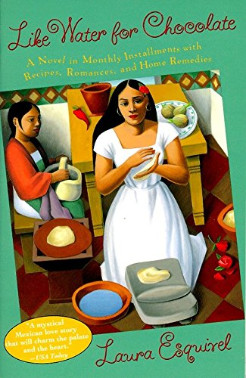PREPARATION:
Take care to chop the onion fine. To keep from crying when you chop it (which is so annoying!), I suggest you place a little bit on your head. The trouble with crying over an onion is that once the chopping gets you started and the tears begin to well up, the next thing you know you just can't stop. I don't know whether that's ever happened to you, but I have to confess it's happened to me, many times. Mama used to say it was because I was especially sensitive to onions, like my great-aunt, Tita.
Tita was so sensitive to onions, any time they were being chopped, they say she would just cry and cry; when she was still in my great-grandmother's belly her sobs were so loud that even Nacha, the cook, who was half-deaf, could hear them easily. Once her wailing got so violent that it brought on an early labor. And before my great-grandmother could let out a word or even a whimper, Tita made her entrance into this world, prematurely, right there on the kitchen table amid the smells of simmering noodle soup, thyme, bay leaves, and cilantro, steamed milk, garlic, and, of course, onion. Tita had no need for the usual slap on the bottom, because she was already crying as she emerged; maybe that was because she knew then that it would be her lot in life to be denied marriage. The way Nacha told it, Tita was literally washed into this world on a great tide of tears that spilled over the edge of the table and flooded across the kitchen floor.
That afternoon, when the uproar had subsided and the water had been dried up by the sun, Nacha swept up the residue the tears had left on the red stone floor. There was enough salt to fill a ten pound sack - it was used for cooking and lasted a long time. Thanks to her unusual birth, Tita felt a deep love for the kitchen, where she spent most of her life from the day she was born.
When she was only two days old, Tita's father, my great-grandfather, died of a heart attack and Mama Elena's milk dried up from the shock. Since there was no such thing as powdered milk in those days, and they couldn't find a wet nurse anywhere, they were in a panic to satisfy the infant's hunger. Nacha, who knew everything about cooking - and much more that doesn't enter the picture until later - offered to take charge of feeding Tita. She felt she had the best change of "educating the innocent child's stomach," even though she had never married or had children. Though she didn't know how to read or write, when it came to cooking she knew everything there was to know. Mama Elena accepted her offer gratefully; she had enough to do between her mourning and the enormous responsibility of running the ranch - and it was the ranch that would provide her children the food and education they deserved - without having to worry about feeding a newborn baby on top of everything else.
From that day on, Tita's domain was the kitchen, where she grew vigorous and healthy on diet of teas and thin corn gruels. This explains the sixth sense Tita developed about everything concerning food.
